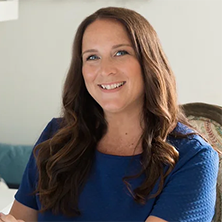Part of the Hiding in Plain Sight blog series
Written by Cathy Cassata, Health & Wellness Writer
Nov. 17, 2022 / Forbes

More than 46,000 people died by suicide in 2020, according to the Centers for Disease Control and Prevention, making suicide a leading cause of death in the United States.
The loss of a loved one to suicide can stir up complicated feelings of grief, guilt, and helplessness.
Vikki Mataragas felt all of these emotions after her 24-year-old son Michael died by suicide in 2014. Michael began showing signs of mental health conditions during adolescence and was diagnosed with schizophrenia at age 22.
“It’s heartbreaking to watch your child struggle,” said Mataragas. “I definitely self-blame and wonder if there was something I could have done better or something that I could have done that I didn’t do at all.”
However, over the years, she learned to lean on faith, family, and friends to cope and found healing through self-care, therapy, and keeping a connection with others who suffered similar losses.
“Knowing that other people have been through this kind of loss helps me realize that I’m not alone and that Michael wasn’t alone either,” she said.
How to help survivors of suicide loss
Knowing how to support a friend or family member who is grieving the death of a loved one caused by suicide can be challenging.
To start, simply talking about the deceased person can make all the difference, said Mataragas. “If anybody ever says Michael’s name, it’s music to my ears.”
Asking questions is also helpful. She suggests saying: Is it okay if I ask you questions or talk to you about Michael? “If I really don’t want to talk about it, then it gives me the opportunity to say it’s too painful to talk about right now,” she said.
Cambria Bruschke, principal consultant of national mental health and wellness at Kaiser Permanente, agreed. Because of the stigma and fear around suicide, she said, many people avoid those who have experienced suicide loss because they don’t know what to say.
“We need to show up in the same way we would for someone who has experienced any other tragic death – be there, listen, and encourage people to talk about their loved ones,” she said.
Avoid expressing the notion that the person is in a better place or that their suffering is over, said Mataragas. “I am relieved that Michael is not suffering anymore, but I wish he was still here.”
Additionally, implying that the person who died by suicide was selfish is hurtful and inaccurate. “When someone dies by suicide it must be like being in a trap with no way out,” Mataragas said.
Learning about suicide can help you develop compassion and understanding. One resource is Kaiser Permanente’s Presence of Mind interactive video When to Get Expert Help, which discusses suicide and how to help a loved one who may be in crisis.
While many researchers have studied suicide, suicide prevention, and suicide loss, Bruschke noted that there is still a lot that is unknown. “We’re still trying to learn what drives people to that outcome, and there is a lot we still don’t understand.”
Doreen Marshall, PhD, vice president of mission engagement at the American Foundation for Suicide Prevention (AFSP), encourages people to avoid making statements like, “I understand what you’re going through.” Even if you have experienced a suicide loss, she said, your experience may have been different.
“Instead, you can acknowledge that you want to understand and that you will be a supportive listener as they navigate their grief. Doing so shows that you recognize the complexity of the loss survivor’s grief and helps keep the conversation open,” said Marshall.
For more advice on how to talk to suicide loss survivors in a kind and thoughtful manner, review the Have a #RealConvo guide on AFSP’s website.
Getting support for your loss
If you are a survivor of suicide loss, Marshall stresses that you don’t have to cope with your loss alone. Try to be open to letting people help you live through the experience. “It is important to find supportive people who will allow you to talk about your loved one, to share memories, and also to process the loss,” she said.
If you’re having trouble connecting with others in your life, consider reaching out to an AFSP Healing Conversations Volunteer, who can talk in-person, on the phone, or via video chat. You can also connect with local bereavement support groups on the AFSP website.
As you grieve, keep in mind that grief has no timeline, Marshall said. “Suicide grief has some complexities, such as trying to make sense of the loss, that may not be present with other manners of death.”
About the Author

I have more than 15 years of experience writing about health, mental health, medical news, and inspirational people. I write with empathy and accuracy and have a knack for connecting with readers in an insightful and engaging way. I have interviewed hundreds of experts from a wide range of backgrounds, including physicians, psychologists, sociologists, researchers, and scientists, as well as everyday people about their personal health journeys. I contribute regularly to Healthline, Health.com, Verywell, and Psych Central, and have been published in Everyday Health and HuffPost. Read more of my work here, and connect with me on Twitter, Instagram, Facebook, and LinkedIn.
The “Hiding in Plain Sight” blog is a series leading to the upcoming 2022 documentary Hiding in Plain Sight: Youth Mental Illness, produced and directed by Ewers Brothers Productions, executive produced by Ken Burns, and presented by WETA, the PBS flagship station in our nation’s capital.
#WellBeings #WellBeingsLive
You are not alone. If you or someone you know is in crisis, whether they are considering suicide or not, please call the toll-free National Suicide Lifeline at 800-273-TALK (8255) to speak with a trained crisis counselor. If you don’t want to talk on the phone, you can also text. Crisis Text Line offers free mental health support. Text “10-18” or “SCRUBS” to 741741 for help. The call and text lines are open 24 hours a day.